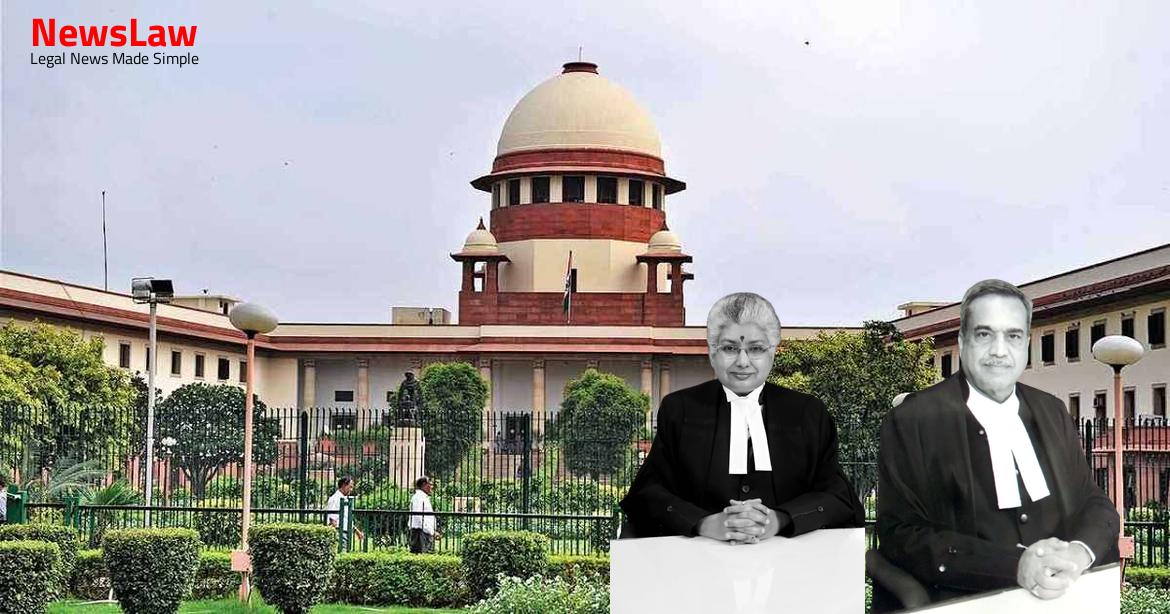Explore the nuances of a recent court case where the focus was on the legal analysis conducted by the court regarding the evaluation of a resolution plan. The court’s in-depth examination of the statutory provisions and adherence to the IBC requirements sheds light on the critical aspects that influence the approval or rejection of resolution plans. Let’s take a closer look at the legal intricacies and key takeaways from this insightful case.
Facts
- An amount of Rs. 53,71,65,489/- is due from the Respondent to the Sales Tax authorities towards CST and VAT.
- Insolvency and Bankruptcy Board of India has framed regulations for Insolvency Resolution Process for Corporate Persons.
- Changes were made to the submission of claims by creditors under the 2016 Regulations.
- Claims were to be submitted by a specified date as per the public announcement.
- Various legal proceedings were initiated against the respondent for dues.
- Resolution Professional informed the appellant that their claim had been waived off.
- Committee of Creditors passed a resolution to replace the IRP.
- Appellate Tribunal dismissed Company Appeal against the Adjudicating Authority’s order.
- The appellant challenged the Resolution Plan regarding Government dues.
- NCLAT held its judgment on the resolution plan dispute.
Also Read: Judicial Promotion Dispute Resolved
Arguments
- The term ‘Secured Creditor’ as defined under the IBC is comprehensive and covers various types of security interests.
- The Appellate Authority’s finding that the State is not a secured creditor is contrary to law.
- The RP failed to include the State’s claim in the Resolution Plan despite it being submitted in time.
- The RP’s duty was to receive, verify, and collate claims, forwarding them to the Adjudicating Authority for approval.
- The State, as a Tax Department, falls within the definition of ‘Secured Creditor’ under the IBC due to statutory charges.
- The NCLAT erroneously concluded that the State is not a secured creditor based on the supremacy of Section 53 of the IBC over Section 48 of the GVAT Act.
- The RP neglected to examine the Corporate Debtor’s Books of Accounts and include the State’s dues in the Resolution Plan, violating statutory requirements.
- RP’s duty is to receive, verify, and collate claims only.
- Adjudicating Authority examines if Resolution Plan meets Section 30(2) requirements.
- Section 30(2) mandates RP to ensure Resolution Plan follows specified parameters.
- Resolution Professional lacks adjudicatory powers to accept or reject claims.
- Cited case: Swiss Ribbons (P) Ltd. v. Union of India.
- RP’s role is limited to ensuring Resolution Plan compliance.
Also Read: Ex post facto Environmental Clearance in Bio-Medical Waste Case
Analysis
- Section 61(3) of the IBC outlines the grounds for challenging the approval of a Resolution Plan.
- Section 53 of the IBC specifies the mode and manner for distribution of proceeds in liquidation.
- Section 31(1) of the IBC grants powers to the Adjudicating Authority to approve a Resolution Plan.
- Section 30(2)(b) imposes an obligation on the Resolution Professional to ensure payment to operational creditors in a resolution plan.
- A resolution plan approved by the Committee of Creditors may be approved by the Adjudicating Authority under certain conditions.
- Expression ‘may’ can be construed as ‘Shall’ if circumstances demand
- If Resolution Plan ignores statutory demands, it must be rejected
- No obligation for State to lodge claim for statutory dues
- Claims invited before the deadline, no claim filing required by Appellant
- Resolution Plan must meet statutory provisions for approval
- Information Memorandum preparation is mandatory for Resolution Professionals
- Resolution Plan not meeting Section 30(2) requirements is invalid
- Resolution Plan must not favor creditors at the expense of statutory dues
- NCLAT misinterpretation of Regulations
- The Adjudicating Authority can only approve a Resolution Plan if it meets the requirements of Section 30(2) of the IBC.
- If a Resolution Plan does not meet the requirements of Section 30(2), it cannot be approved.
- Time stipulation in Regulation 12 for submission of a claim is considered directory and not mandatory.
- The Resolution Professional (RP) is required to submit the resolution plan approved by the CoC before the adjudicating authority at least fifteen days before the maximum period for completion of Corporate Insolvency Resolution Process (CIRP).
- The Adjudicating Authority shall approve the resolution plan under Section 31(1) if it complies with the requirements of Section 30(2) of the IBC.
- Discretionary power conferred by Section 31(2) should not be exercised arbitrarily, whimsically, or without proper application of mind.
- If a Resolution Plan is not in conformity with the law, provisions of IBC, or the Rules and Regulations framed thereunder, it should be rejected.
- Appellate Authority and Adjudicating Authority erred in law in rejecting the application/appeal of the appellant.
- The delay in filing a claim cannot be the sole ground for rejecting the claim.
Also Read: Land Dispute Legal Analysis
Decision
- The impugned orders and the approved Resolution plan are set aside.
- Resolution Professional is directed to consider a fresh Resolution Plan taking into account the observations mentioned.
- No costs are awarded in this matter.
- The Resolution Applicant is allowed to submit a plan considering the dues of statutory creditors like the appellant.
Case Title: STATE TAX OFFICER (1) Vs. RAINBOW PAPERS LIMITED (2022 INSC 927)
Case Number: C.A. No.-001661 / 2020



